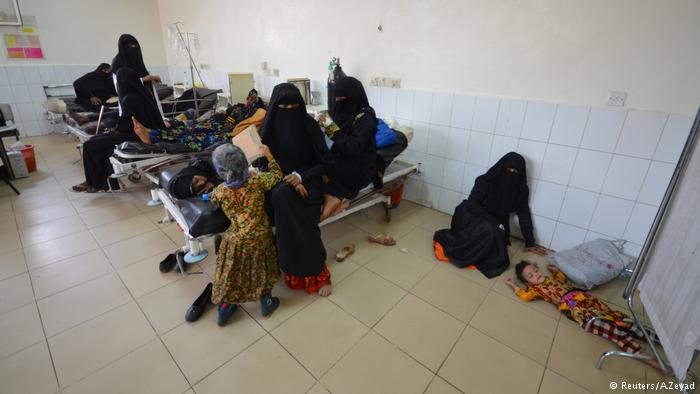Al-Sabah Al-Yemeni| news agencies |
Yemen has found itself in the middle of a humanitarian catastrophe. Even as the country battles with crumbling infrastructure, hunger and disease, the Saudi Arabia-led military intervention continues.
Yemen is suffering from two humanitarian catastrophes: The country is facing not only a major cholera epidemic but also a famine. This is according to several UN agencies – children’s aid program UNICEF, the World Health Organization (WHO) and the World Food Program (WFP) – who issued their warning in a recent joint statement.
“This is the world’s worst cholera outbreak in the midst of the world’s largest humanitarian crisis,” the statement read. Since April 2017, there have been 400,000 suspected cases of cholera. Around 1,900 people have already died from the disease. Meanwhile, roughly 2 million children have suffered from acute malnutrition. Some 60 percent of the people have no idea where their next meal will come from.
Hospitals in ruin
The situation has worsened as the country’s health system finds itself on the verge of collapse. According to the UN agencies, critical parts of the country’s infrastructure, including medical facilities as well as facilities that ensure the country’s sanitation and water supply, are badly damaged. In the midst of this chaos, some 16,000 volunteers have offered their services to help.
More than 30,000 medical employees have gone over 10 months without payment. Nonetheless many have continued to work. “We have asked the Yemeni authorities to pay these health workers urgently because, without them, we fear that people who would otherwise have survived may die,” the UN agencies said in their statement. “As for our agencies, we will do our best to support these extremely dedicated health workers with incentives and stipends.”
Accusations of torture
There appears to be no end in sight to the conflict. On the contrary, the war has taken on an even more brutal turn. Human Rights Watch has accused the Saudi-allied United Arab Emirates (UAE) of backing Yemeni fighters engaging in torture against prisoners allegedly tied to al Qaeda and the so-called Islamic State (IS). In addition, the UAE oversees at least two prisons where people are allegedly tortured.
“You don’t effectively fight extremist groups like al Qaeda or [IS] by disappearing dozens of young men and constantly adding to the number of families with ‘missing’ loved ones in Yemen,” said Sarah Leah Whitson, Middle East director at Human Rights Watch.
Civilian casualties
At the same time, the US and UK-backed, Saudi-led coalition has resumed its relentless offensive. According to the UN, the coalition’s air forces do not give civilians much consideration during their air raids.
Not long ago, the UN reported on an airstrike in the country’s southwest province of Taiz, where over 20 displaced civilians were killed. The organization said there did not appear to be any military targets in the immediate vicinity of the destroyed house.
Riyadh on the defensive
Saudi Arabia itself has said there is no alternative to waging a war against the insurgent Houthi rebels. Or at least that seems to be the justification from an interview given to the broadcaster Al Arabiya by crown prince Mohammed bin Salman.
“Nobody wants the war to continue,” said bin Salman, who is also the country’s defense minister. Nonetheless the kingdom, which has waged war in its neighboring country for over two years now, has had “no choice.” Terror groups attacked the country’s legitimate government. If Saudi Arabia had not acted, Riyadh’s thinking goes, the security of the whole region would have been endangered.
The war, which has claimed some 10,000 lives to date, seems to be growing more brutal by the day. One recent video shows Yemeni troops shooting and partially decapitating captured Houthi rebels.
Religious terrorism
At the same time, religiously motivated terrorist incidents have increased in Yemen. In the port city of Aden, a young activist named Amjad Abdul Rahman, who was the leader of a group advocating for religious freedom and women’s rights, was shot and killed in an internet cafe. The following day, extremists interrupted his funeral procession and refused to allow him to be buried in a Muslim cemetery because Rahman was a “non-believer.”
The growing influence of religiously motivated terrorism has called into question the logic behind the Saudi-led coalition’s actions.
DW
خليك معنا

